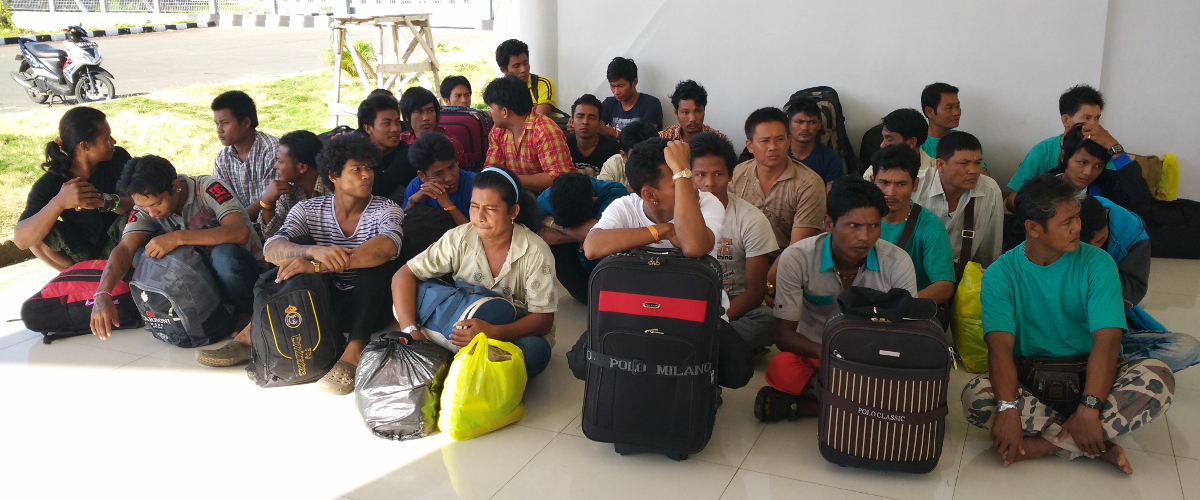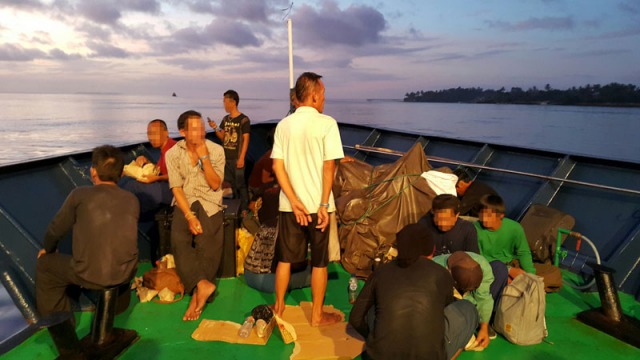In May 2015, the International Organisation for Migration (IOM) approached the Jesuits in Jakarta for the help of Myanmar scholastics as translators for its interviews with Myanmar citizens who had been enslaved in the Thai fishing industry. Several scholastics did so, among them Simon Kam Sian Muan, who is now back in Myanmar for his Regency. He shares here what he learnt from the experience.
As I approached the end of my philosophy studies in Jakarta, I was asked to help the Myanmar citizens who had been rescued from forced labour in the Thai fishing industry. Together with some IOM staff, we spent a week in Tual town, Maluku province, interviewing them about their experience on the fishing boats, how they had come to Thailand and Indonesia, how long they had worked, and about their salary. My job was to translate what they said in Burmese into English or Indonesian, but it was also an opportunity for me to get to enter into the lives of these suffering people, my countrymen who had left home in search of a better job and pay, and had ended up as slaves.
Most of them had crossed the border at Myawadi Town with the help of brokers who had promised them a stable job and a quite sufficient salary. They were transported from the border to Ra Naung town in Thailand inside a closed container to avoid being seen by the police. Some made the journey walking at night and hiding during the day for many days. When they reached Ra Naung, they were locked in a warehouse for a few days before being transferred to the ship. After sailing for 15 days, they arrived in Indonesian waters. They got into Thailand and Indonesia without legal documents. All they needed were the seaman books the captains made and kept for them before leaving Thailand. With that, they got new identities with Thai names.
Many had been promised a monthly salary of 9,000 baht (US$250) and told they could go back after one or two years. But some had come without any prior information about where they were headed and what salary they would receive. They told me that they were ready to do any work that could pay them more than what they could earn in their villages, which is very little.
Lack of education (many of them are illiterate), lack of work opportunities at home and poverty were the main factors that drove them to risk their lives in search of a better wage. This made them vulnerable to being cheated by brokers, and they ended up being unpaid labour, working with very little sleep. Every four hours, they had to pull up the nets, take out the fish and store them in the big refrigerator. If the nets were damaged, they had to repair them before throwing them back into the water. For all this hard and tiring work, most of them were paid only enough to cover their snacks and drinks.
One man shared that he had worked for three years with the captain’s prior verbal contract of being paid 9,000 baht per month. This means he had earned 324,000 baht (US$9,000). But he was paid 1,000,000 rupiah (2,600 baht, US$73) when the ship docked every two to three months and during the three years, received only about 50,000 baht (US$1,400). The remaining 254,000 baht (US$7,100), after deducting the broker fee of 20,000 baht, was unpaid even after they reached the rescue camps in Tual town. The men had lost hope of receiving the payment they were owed and even of seeing their families again. When told about the chance to return home, some wondered if it was another trick by their captains. They could not think of what they would do after they got home. They just wanted to be home where they could feel safe.
I had heard about people going out of Myanmar for work without proper documents but this was my first encounter with people who had been trafficked. I realised I was seeing modern slavery right in front of my eyes. What I saw and heard made me angry with the people responsible: the brokers, captains, fishing boat owners who prey on desperate and poor people. Each one of us – individuals, institutions and nations – has to fight human trafficking. We need to educate people in the rural areas about human trafficking. We need to measure the development of our countries not by the numbers of malls and cars in big cities but by how it benefits the people with, for example, access to good education, transportation, energy, water and jobs.
I hope that as my country moves towards becoming a more democratic nation, our people will have opportunities for education and work to sustain their lives. They should not have to risk their lives just to earn some money to live on. May those still lost and silent in other countries find their way back home and may what they search for be found in their country.
Learn about forced labour and trafficking in Southeast Asia’s fishing industry in this Pulitzer Prize-winning series of reports by The Associated Press. Its investigation resulted in the release of more than 2,000 captive workers forced to work in slave-like conditions to supply seafood to supermarkets and tables around the world.
Read an update by the International Organisation for Migration here.








